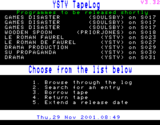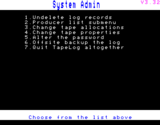Tapelog
Tapelog is YSTV's system for keeping track of what is recorded on all our video tapes, and finding where there is free space to be able to record something. The idea is that every use of the tape should be recorded, so that it should be possible to recover the footage assuming nobody recorded over it.
Paper based
In 1995, YSTV's tape log system consisted of a set of A4 notebooks. VHS, Umatic and SVHS tapes were each assigned a separate notebook and each tape was assigned a page within the notebook. At the time there were about 140 Umatic, 70 VHS and 20 SVHSUnverified or incomplete information. Typically VTs for programmes would be produced on Umatic, and programme output would be recorded onto VHS, or more commonly SVHS. Some programmes would, unofficially, commandeer their own VHS tape and mark it (on the label) with the name of the programme. At times, these tapes would be hidden by the programmes' producer within the station, in order to prevent them being recorded over by another programme.
BBC Micro based
Version 1
The paper based tape log had been instigated many years before, and the quality of the record keeping was dubious in places. During 1995, Chris Kwouk developed YSTV's first computerised tape log system using a BBC Micro.
As well as recording the contents and the quality (tape not programme!) of the tape, it also allowed tapes to be checked out and in of the archive. If a tape was being worked on it would be checked out and then checked back in when the work was complete. At the time of installation, a lot of time was spent going through the archive (usually at max speed on the Umatic system), and updating the log with any deletions or ommissions.
The software used a devious modulus-odd-number algorithm to locate records quickly within the log as the BBC Micro didn't have enough memory to load the entire log at once, however the speed of the floppy drive rendered this optimisation rather academic.
Overall reaction to the system was positive.
Some programmes, Miss dRAG being an example, were duplicated from an SVHS master (usually for distribution purposes for paying customers or complimentary purposes) and a VHS copy stored in a marked case within the tape shelves but not in the tape log.
Version 2
This was an updated version in 1996 also by Chris Kwouk.
Version 3
By 1997, changes in the station meant that a lot more SVHS tapes were in use and the use of the UMatic was declining. Versions 1 and 2 could not easily be changed to handle the ever expanding tape collection, and a new version was born.
Its key enhancements included
- A new date format to cope with Y2K problem
- An automatic weekly backup, in its extensive use the disc surface became worn, backing up the data onto another place on the disc shared the wear
- A screensaver, as the Cub monitor had rather bad screen burn
- Editing of the producer list, this feature had a menu entry in Chris' system but wasn't implemented due to the complexity of keeping the log consistent when a producer was renamed or deleted
- Selective and improved log searching using wildcards
- Offsite backups, added in version 3.30, so the database could be exported to a web interface periodically
Although under the bonnet it was effectively a complete rewrite, version 3 kept the familiar user interface from Chris' version. The top portion of the screen was used to display log entries that were about to be expired (for a period of a week) so that active members might elect to extend their release date or let the entry lapse. The bottom portion had a simple menu selection for the most common options (and a hidden entry to display the administrative interface).
The BBC Micro version suffered a little by being attached to a very slow disc drive. For a few brief days in 1998 a prototype RAM disc was used instead (simply copying the floppy contents onto the new hardware at startup) speeding up the log by a factor of 30.
In summer 2001 a donation from Peter Elvidge of a faster Acorn Archimedes computer with harddisc meant that the whole log was virtually instantaneous. However, this coincided with the database based version and saw little active service.
Database based
Later Kevin Bowman transferred the data into a MySQL database and wrote a PHP front end, which ran on it's own PC in the control room, a net saving of zero computers.
Several features including the admin interface went and stayed missing at this point. All entries marked as deleted in the BBC database were also lost as only the current content was migrated.
Dave Baker merged this into the YSTV website proper so it could be used from anywhere, and did some XHTML clean-up. David Furey later added a few of the most urgent missing features to it, after nagging from Richard Ash about not being able to edit shows or view deleted entries (which were kept in the database, but not visible).
Items that pass their expiry date should automatically be marked as deleted, so they are counted as empty space when looking for space to make new recordings. Not all of this is currently working.

